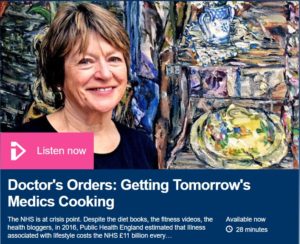
Currently, medical students get almost no training whatsoever about the effects of diet and lifestyle on our health. It’s just been reported that they may be starting to complain about this and demand more instruction in the importance of nutrition. But is this the wind of change or simply a puff of hot air?
It seems criminal that doctors don’t know why their patients are fat, diabetic, hypertensive or generally suffering from a range of non-communicable chronic diseases that are clearly related directly to their dietary and lifestyle habits.
When a patient asks his or her doctor “Why am I fat?” with what answer does the doctor respond? What treatment is prescribed?

On BBC Radio 4’s The Food Programme, Dr Rangan Chatterjee, said: “The health landscape of the UK has dramatically changed over the last 30 or 40 years and I think the bulk of what I see as a GP now – almost 80% – is in some way driven by our collective lifestyles.”
It’s estimated that the NHS (UK’s National Health Service) is likely to spend over £11bn on diabetes alone in the coming year. Associated impacts on time off work and social care bills will probably double that amount. And this is a disease that is avoidable and treatable with a WFPB diet.
The UK has the worst record for obesity in Europe. Type 2 diabetes is strongly associated with obesity. And obesity is strongly associated with diet and lifestyle. So it’s inconceivable that doctors are not at the very least trained in how to give their obese/diabetic patients advice on what they they should do about changing the cause of their illness. Instead, doctors are only trained in how to hand out pills or, when things have been allowed to develop to critical levels, to recommend invasive surgical procedures.
Dr Michael Mosley, a presenter on BBC One’s Trust Me I’m A Doctor, said:
“Unfortunately it’s not part of the traditional training. At medical school I learnt almost nothing about nutrition. And I have a son at medical school and it’s again not part of his key curriculum. So I don’t get the sense that there are lots of doctors out there who feel empowered to tell patients much about nutrition.”
As a nation of people with opinions on almost every matter under the Sun, why do we allow this ludicrous situation to continue? Why do we have to seek out alternative health practitioners, or search on the internet for some website like this one, for guidance on health matters that should be at the core of modern medical practice and dealt with as the first item on the agenda when walking into a doctor’s office?
Some hope is coming from Bristol University where, in 2017, nutritank was created by medical students concerned about the lack of nutrition/lifestyle training in their medical degree courses. It has now spread to 15 other student-led groups at UK universities as a means of medical students being able to share nutrition science research and to organise events and lectures on campus.
One of the founders of this movement, Ally Jaffee, said “We’re taught about 10 to 24 hours over five to six years in medical school on nutrition.”
[su_quote cite=”A crazy imbalance”]80% of non-communicable diseases are thought to be caused by diet and lifestyle. Only 10-24 hours in around 6 years of medical training are spent on the effects of diet and lifestyle. [/su_quote]
And the time spent on nutrition will most likely be concerned with reductionist details like macronutrient metabolism, nutrient absorption in the gastrointestinal tract, with next to nothing on the broader impact of diet on our leading causes of disability and death, and even less on what advice doctors should be giving patients.
This month, the BMJ (British Medical Journal) announced that it will launch a journal on the science and politics of nutrition in June 2018. Dr Fiona Godlee, editor-in-chief of the BMJ, told the BBC:
“It’s time we recognised that food and nutrition are core to health. There is a growing body of research out there that needs to be published – and we want to contribute to that effort.”
She continued to say that the same levels of quality and scrutiny should be applied to food science that are applied to other areas of health research.
The BMJ appear to have been prompted into action as a result of an article published in October 2017 written by two University of Cambridge graduate medical students, Kate Womersley and Katherine Ripullone, where the former student said:
“I was in an obesity clinic as part of my medical shadowing…A patient came in and said very frankly to the doctor, the consultant in charge, ‘Why am I so fat?’… The patient was asking a very straightforward question and I think was expecting a straightforward answer…But often that’s a question where doctors seem to clam up a bit…We were interested to write this piece for the BMJ, because we didn’t feel prepared to be receiving that question…Students need to see nutrition as something at the cutting edge of scientific discovery. I think there needs to be an image change of how doctors perceive nutrition, but also how it’s presented to students.”
The GMC (General Medical Council) gives guidance and publishes general standards of practice for medical schools in the UK. This summer, it will be releasing revised guidance on the impact of nutrition on human health.
We will have to wait to see when and if the medical profession wakes up to the pretty obvious solution to the growing epidemic of diet/lifestyle-related chronic diseases. And as I pointed out here and here, there is every reason to believe that powerful political and financial forces are likely to make it very difficult for the status quo (the existing paradigm) to change any time soon.